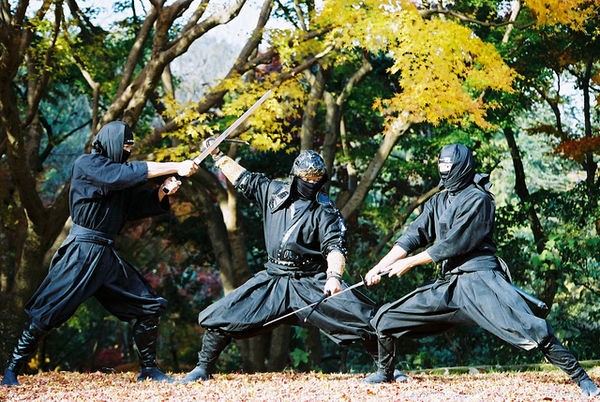Do you know what idioms are? These are words or phrases that have meanings beyond the interpretation of the word. In Japanese, idiomatic words are called Kanyouku [慣用句]. In this article, we are going to see a gigantic list of idioms in Japanese.
For those who live in the world of the moon, idioms are phrases or words that have hidden meanings that cannot be seen just by reading, but by living the daily life and culture of the nation. Expressions such as abandon ship (give up), hang up your boots (retire), walk on eggshells (delicate situation) and so on.
Table of Content
Kanyouku - Idioms
The word Kanyouku [慣用句] is composed of the ideograms [慣], which means to accustom; [用], which means to use and employ; and [句], which means phrase. This means that we need to get used to the fact that the expression means something beyond what we read or hear.
In English this type of expression is called Idom which in Japanese is transcribed as [イディオム] language. There are other Japanese words that basically refer to the same thing, which are:
- Kanyouku [慣用句] - Composed of two or more words;
- Kanyougo [慣用語] - Idiomatic Language;
- Kanyougoku [慣用語句];
- Kanyouhyougen [慣用表現] - Fixed Expression;
- Kanyourengo [慣用連語]
- Seiku [成句 - Idiomatic Expression; Aphorism; Proverb; Quotation;
- Jyukugo [熟語] - With Ideograms;
- Yojijukugo [四字熟語] - With four ideograms;
Each of the above terms has a different nuance that I personally can't explain, but it's generalized as [イディオム]. It can sometimes be confused with the Japanese Kotowaza proverbs which can also be considered idiomatic phrases.
Read also: Kotowaza – Short Japanese Proverbs
It is worth remembering that some slang and swear words are idiomatic expressions. In fact, many words in the Japanese language are at least a little idiomatic, mainly because they group together many meanings and have ideograms.
Generally an idiom can contain proverbs, lessons, sarcasm, law of things and others. It is also worth remembering the word Kakugen [格言] which are easy to remember expressions about human life, truths, commandments, martial arts, prices, quotes, warnings and business.
Read also: 100 Curses and Insults in Japanese
An example of Kakugen is in the Bible in the Gospel of Matthew where it says "Enter through the narrow gate" [狭き門より入れ]. Or Sangokushi's expression "Cry and cut the horse" [泣いて馬謖を斬る].
Idioms are also metaphorical expressions with fixed meanings. If you don't understand the meaning correctly, you may use it in a strange way or you may give the wrong answer to the person who used it.
Now you will informally learn to speak Japanese using popular idioms. The list below has words and phrases that take on different meanings than the words would have if they were expressed alone.
You might want to buy a cheap book on Japanese Idioms below:

Idioms in Japanese
The Japanese Idioms from the list below:
Barcode Man Bākōdo hito [バーコード人] Used to refer to some types of hairstyles.
The join keep suffixed kun [君] Kiipukun [キープ君] - Means keep dating until you find someone better.
Hard Butt, Soft Butt and Clean Butt Shirigaomoi [尻が重い] - Heavy Ass to refer to the lazy and indolent. Shirigakarui [尻が軽い] - Light Ass to refer to the careless; reckless and promiscuous. Shirinugui [尻拭い] - Cleaning Ass means cleaning up someone else's mess.
pull the hand Tewonuku [手を抜く] - Doing a bad job;
light mouth Kuchi ga karui [口が軽い] - Unable to keep a secret.
My head hurts Atama ga itai [頭が痛い] - To stress about something.
fire in hand Hinote [火の手] - Attack, aggression.
good in the head Atamagaii [頭がいい] - Intelligent, brilliant;
two melons Urifutatsu [瓜二つ] - As similar as (two peas in a pod).
Sleep with ears in the water Nemiminimizu [寝耳に水] - Big surprise, shock, astonishment;
sell oil Aburawouru [油を売る] - Wasting time; delaying;
black belly Haragakuroi [腹が黒い] - Conspirator; malicious; wicked.
Idioms involving animals
Cat's tongue Nekojita [猫舌] - Used to refer to people who are sensitive to hot drinks.
cat's veil Nekokaburi [猫かぶり] - Like a wolf in sheep's clothing, someone who pretends to be naive.
sparrow tears Suzume no namida [雀の涙] - A small amount, an insignificant amount, to fall in the bucket.
in the horse field Yajiuma [野次馬] - Curious spectators, people who go after an incident that does not concern them; rubberneck;
- Mushigaii [虫がいい] - Selfish; asking too much;
- Kenennohaka [犬猿の仲] - Like cats and dogs (in this case monkeys and dogs);
Below are some more idioms involving cats:
- Nekonoatama [猫の額] - Cat's forehead; A small place;
- Nekonome [猫の目] - Cat eyes; The situation changes quickly;
- Dorobouneko [泥棒猫] - Does bad things secretly; home wrecker;
As time passes, I will update this list. If you wish, we have a PDF file in Japanese with a list of over 1000 idiomatic expressions that can be downloaded from the site: biglobe.
